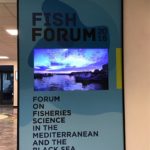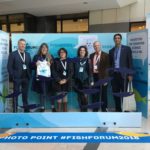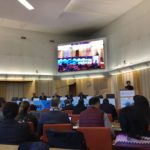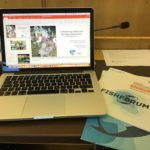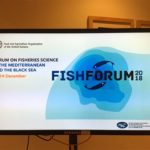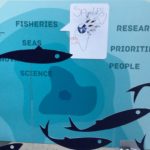Project SponGES featured at FishForum 2018 with a side event organised on December 11th 2018.
Held at FAO’s headquarters in Rome from December 10th to December 14th 2018, FishForum2018 brought together the wider community of scientists and experts working on fisheries and the marine environment in the Mediterranean and Black Sea in order to build a lasting network, discuss advancements in research, integrate scientific knowledge in support of decision-making and identify research priorities for the coming decade.
A range of presentations took place during the SponGES side event, covering the development and preliminary results of the SponGES project.
Hassan Moustahfid (FAO) opened the meeting and welcomed the participants. After giving a brief introduction to the world of sponges, he spoke about the role that FAO has been playing at the interface between science and policy, and remarked how important the idea of Vulnerables Marine Ecosystems brought forward by FAO is for environmental protection, namely in fisheries.
Joana Xavier (CIIMAR and SponGES scientific manager) provided a more detailed description of the diversity and distribution patterns of sponges and sponge grounds in the Atlantic and Mediterranean, highlighting the linkages between these two basins. This presentation also covered the conservation measures and international regulations currently in place to protect sponge VMEs and the management-support tools (e.g. sponge ID guides, sponge grounds classification system and the SponGES data portal) being developed in scope of the project.
Ellen Kenchington (DFO Canada and SponGES co-coordinator) presented on behalf of Daniela Ottaviani (FAO). This talk covered sponges’ functions and services and ecosystem valuation. Estimating the monetary value of services makes a cost-benefit assessment possible which can support the trade-off between interests. The presentation focused on 4 functions of sponges: supporting, provisioning, regulating and cultural. Apart from fisheries, pharmaceutical compounds provide important economic aspects and attract major interest.
Hans Tore Rapp (UiB, SponGES coordinator) spoke about sponge grounds ecosystems characterisation, mapping and modelling. Data and samples have been collected leading to ecosystem characterisation and habitat description and mapping. Registration of past and current occurrence of sponges together with environmental drivers into a SponGIS database makes it possible to model and produce both hindcast and forecast of sponges distribution. Both coverage and high-resolution maps can be produced.
Ana Colaço (IMAR) spoke about threats and impacts to sponge grounds ecosystems, specifically the effects of fisheries and climate change on sponges and sponge grounds. Impacts were assessed in relation to effects on sponges, the community, the habitat and the services provided by sponges. Bycatch by long-lines can be reduced by modifying the gear while the impact of trawling is long-lasting and recovery of tracks on the sea bottom are slow. An estimate of the loss of ecosystem service (carbon removal/recycling) by removal of sponge biomass and thereby filtration capacity was provided. Multi-stressor experiments (pH and temperature) were described. It seems that some sponges can cope with some stressors, but multiple stressors may compromise the integrity and cumulative effects are possible.
Hassan Moustahfid completed with a presentation of the FAO Deep-Sea Fisheries (DSF) Guidelines of 2008 highlighting the key actions in the guidelines including the precautionary approach. He also presented the major achievements made by the Regional Fisheries Management Organizations (RFMOs) in applying the FAO DSF guidelines, and how RFMOs by application of the DSF Guidelines, are helping to achieve the Sustainable Development Goals (SDGs). The FAO VME DataBase illustrates clearly their contribution.
The session ended with an interesting discussion with all participants. Among the topics discussed were the relation and support to the EU measures and regulations, sponge’s importance for fisheries catch, further development of VME guidelines and how data and knowledge developed in the SponGES project for the North Atlantic can be transferred to the main stakeholders working in the Mediterranean Sea.
